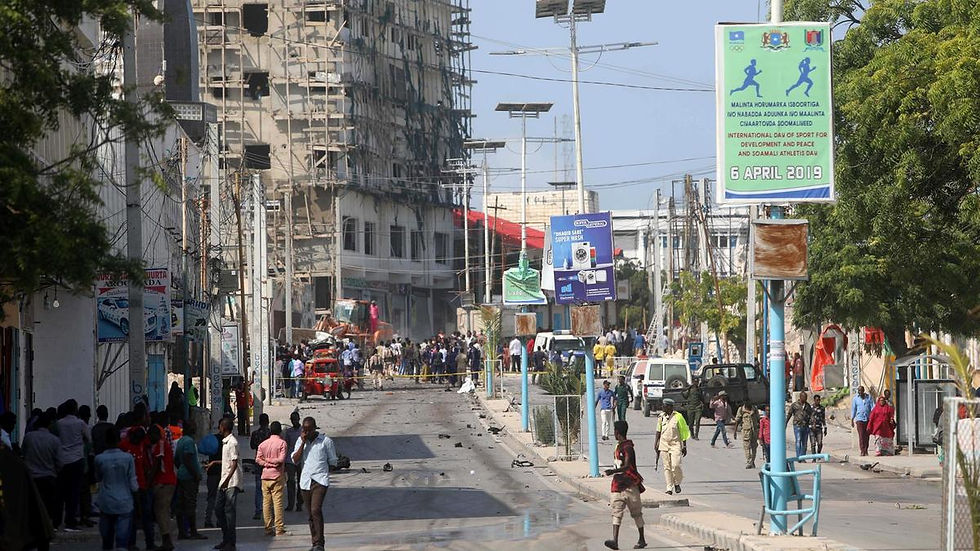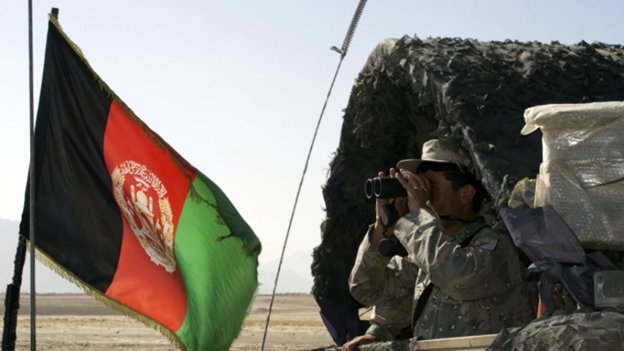Failed States
- Tania Rey García

- Sep 3, 2020
- 8 min read
Updated: Dec 12, 2020
What is a "failed" state?
The term failed state is a relatively new concept (XIX century) that is not very familiar to us. Identifying a state not recognized by the international community is a difficult task since the consensus is needed to include them as actors under the same legal rules. Moreover, there are other aspects to be considered when determining the legitimacy of a state. This is why it's so difficult for us to define the concept of "failed state" and to specify when a state meets the main premises to be clasified as such.
A state is a territorially delimited entity formed by a population, that is governed by a legitimate or sovereign subject, but this is not enough to create a state, since there are territorial entities that have achieved, better or worse, these aspects and still they don't get recognition. So, international recognition is an essential aspect that a state needs to be considered as such.
Certain reasons make difficult the recognition of states such as the violation of human rights or the exercise of activities considered illegal by the international community. Among them, we can find expansionist states, states violators of international law or terrorist groups. As there is a vacuum in the territory, they don't offer any form of control to activities that suppose immediate danger to their citizens and to the rest of the countries. Thus, we can highlight some activities linked to illegality such the increase in arms trafficking in Syria, human rights violations against immigrants in Libya or drug trafficking in Afghanistan.
However, some failed states aren't an international threat by themselves, contrary to the cases exposed above. Despite not being related to these activities considered illegal, they don't obtain international recognition, therefore, they cannot be considered "states". (What does it take to become a state?)
Regardless of the different types of states and their capacity to achieve the aspects listed above, there is no middle ground in the classification between "state" and "non-state", so here comes the problem. What is more, there are many exceptions of states that accomplish with the main prerequisites to become a state. However, there is still an international debate about whether their sovereignty should be recognized or not because there is, for example, a lack of basic rights for their population.
These countries has "limited recognition", menaing that they have the three main prerequisites established by International Law (population, borders and a sovereign governemnt) and for that reason, they constitute a legal society and a state, but their sovereignly is not recognized due to legal or political questions.
The following countries are colored in the map regarding their level of recognition. For example, China is green because it's "recognized by the majority of the UN members". The northern part of Cyprus is pink because it has "limited recognition among the UN members". Palestina is orange becuase its "status is disputed and the governemnt is recognized by at least a few dozen countries of the UN". Last but not least, Somalia is colored red becuase has "no recognition from UN members".

Source: Recognition problems, (Barry Kent)
A difficult classification
Some authors consider that there is no clear academically accepted definition or universal way to denominate a State as "Failed". In that way, the concept can be manipulable both politically and methodologically. For these authors, there are serious difficulties in determining when a State is failed, as there is no unanimity on what is the “monopoly of the legitimate use of force".
In general terms, the term is used to refer to a sovereign state that has failed in the exercise of its basic and essential functions based on a stable political regime, economic stability and security aspects.
The failed state may not control parts of its territory, nor does it control the external borders. Instead, it may have armed factions, terrorist groups, or criminal organizations carrying out illegal activities and constantly challenging the authority of the State. They have a weak and sometimes non-existent government, characterized by a lack of legitimate authority in decision-making. State institutions are weak, with little capacity to apply the laws and exercise justice, with a high level of corruption. It does not provide basic public services to the population such as health and education and lacks basic infrastructure (electricity, water, sanitation). Indeed, the economic system is characterized by its weakness, the non-existence of a tax system.
All of these issues take place within a background of violence that may be the result of civil war confrontations between factions or terrorist groups.
Why do "failed states" arise?
Two main reasons explain the emergence of these states: the end of the bipolar world (the United States and USSR leading the international community), and the creation of new states with the disappearance of the Soviet bloc after the Cold War (1945 -1991).
From 1990 to 1992 only 20 states were recognized by the United Nations. From decolonization to the end of the bipolar world, many states gained independence and inherited colonial structures, poverty and inequality. These aspects did not only impede their development, it also increased their fragility while facing internal and external threats.
In 1995, an investigation, commissioned by the CIA, was carried out on these states, entitled “Working Papers. State Failure Task Force Report". It analyzed demographic, economic, environmental, and political factors to determine their importance in the emergence of a failed State. Among the conclusions of the research, foreign investment and the existence of political elites representing just a little sector of the population were pointed out as common characteristics of fragility among these states.
On the one hand, the internal causes mainly serve demographic, economic and security criteria. Thus, a country engaged in a civil war or a state where a minority of the population remains in power is more likely to collapse than another in which there is a division of power. On the other hand, there may be external causes involved. They are broader and range from the foreign military presence (of a third state) to the imposition of sanctions, low world trade influence or the presence of many natural disasters.

"Somalia is the best example of failed State. The African State has no effective government since 1991, it has two independent regions and the southern part is controlled by an Islamic militia". CadenaSer
As if that wasn't enough, the imposition of economic sanctions after a war is also a determining factor for the emergence of these states. These sanctions affect not only the trade and economic development of the country to which they apply. They may encourage internal repression and impede the development of human rights for the civilian population. In this sense, the emergence of failed states in the '90s could have to do with the rise of economic sanctions, both multilateral and unilateral, after the end of the Cold War.
When we considered a state as "failed"?
As mentioned above, there is a big difference between states in terms of stability. The problem with the concept "failed state" is that it encompasses very different and varied cases since there is no middle ground in which we can include them. For that reason, there are different circumstances and classifications within this very abstract category.
Since 2005, the Fund For Peace (FFP) has used twelve indicators to prepare its annual Failed States Index. Likewise, they justified the renaming with the “fragile” euphemism, arguing that the term “failed” designated a real danger for the inhabitants of a collapsed state. However, voices still disagree with the change of the name, arguing they could have adopted a more neutral approach as "stability". For example, with the name State Stability Index (FFP index).
In the case of state dissolution, it is not equivalent to the failed state. The dissolution is a substitution of the sovereignty in the territory of a state (the preceding one) for another or others (the successors), in which the preceding state becomes extinct as an international subject giving rise to the new state. This process might be peaceful, as happened with the disappearance of the German Democratic Republic, the Soviet Union or Czechoslovakia. Even occurring after a war, the transfer of powers can be carried out in an orderly manner as occurred with the dissolution of Austria-Hungary. Instead, it may be a violent process with outbreaks of anarchy that would bring the territory closer to the concept of a failed state, as happened in the succession wars in Yugoslavia.
Recognition of "failed states" as a state with full rights?
Facing the threat posed by the existence of a failed State, the international community is
forced to act. Such action, however, is limited by the principle of non-intervention, since the failed States are members of the UN. Thus, they are considered sovereign states even if they lack an effective government.
The transition of a state to a "failed state", once it has achieved international recognition, has radical practical effects that cause immediate consequences. There may happen also that a state that has already achieved international recognition could fall under a vicious cycle that would corrupt its institutions. In that way, we would have a state becoming a failed state with sovereignty and full rights in the international community.
Therefore, considering them as international subjects, they become a subject (and object) of international law. It means that they fall under the same rules as the rest of the international community. More importantly, from the moment a state has been recognized by the international community, it undertakes to respect its sovereignty along with its attributes of equality, respect for its territorial integrity and non-intervention in its internal affairs. In that way, the international community cannot interfere so easily in their internal affairs or impose directly their power over them.
We can include here Afghanistan as an example. Geneva Agreement (March 15, 1988) put an end to the Soviet invasion and, subsequently, the end of the communist regime left a country in a civil war situation in which the different mujahideen factions fought to gain control of the state. In this context, the Taliban movement emerged and imposed their rigorous interpretation of Islamic laws, giving refuge to the terrorist network Al Qaeda. However, in 2001 the United States overthrew the Taliban government, supported by an international coalition, in reaction to the September 11th, 2001 attacks. The current political structure in the country was replaced by a more pro-Western government, trying to defeat the Taliban regime that is controlling many parts of the territory.
Contrary to this situation, territories that are not considered states cannot participate in the international debates of the main organisms, supranational and neither intergovernmental. For example, Palestine is a non-voter member in the meeting of the United Nations General Assembly, so its representatives cannot vote any measure that affects the territory.
Why these states comprise a danger to the international community?
Most of the times the failed state enjoys permanent life insurance. Despite the accompanying chaos and violence, these aspects do not jeopardize their survival. Somalia or Afghanistan governments' have not being recognized for the whole international community and their positions in the United Nations General Assembly or the integrity of their territories have not been threatened. Due to state sovereignty and its main derivatives such as independence, territorial integrity or non-interference, they hinder international action.
The humanization of international relations determines that the massive human rights violations and humanitarian calamities that accompany the collapse of the State are not merely internal affairs. Globalization makes it increasingly difficult to isolate areas of insecurity on the planet. Therefore, the international community should be encouraged and forced to act since there is an international structure capable enough to fill the deficiencies of the failed state, guaranteeing the safety of individuals.
Tania Rey García


Comments